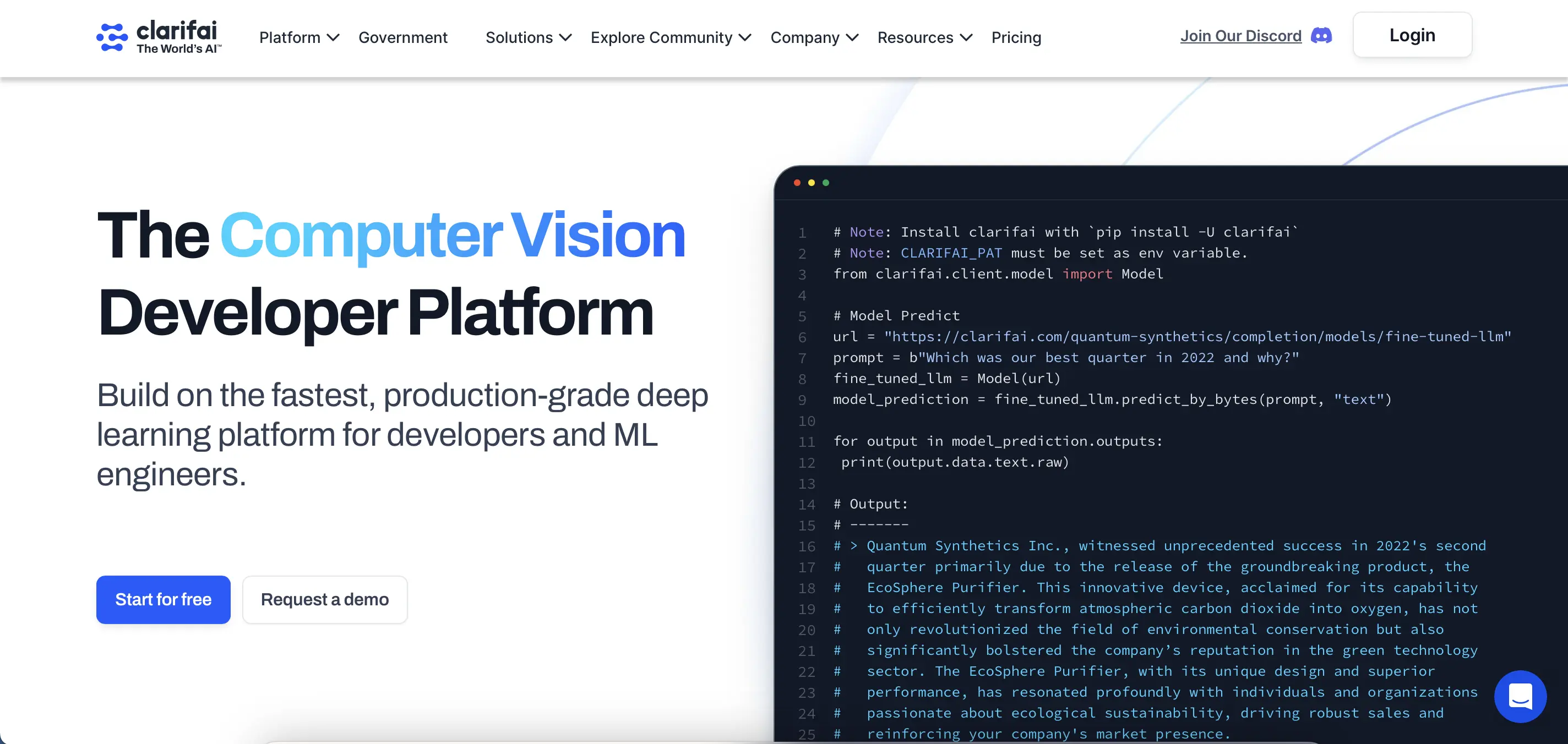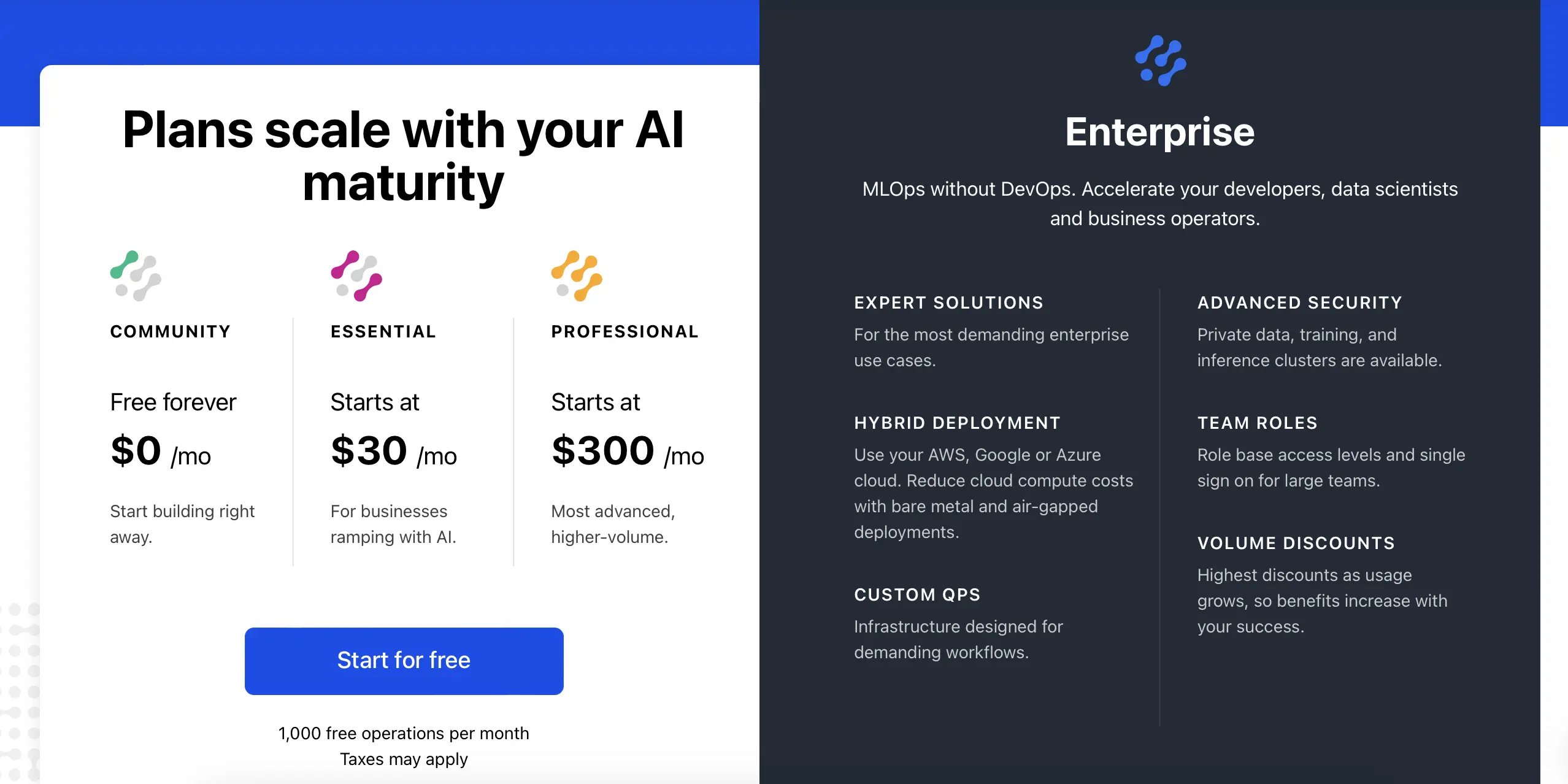8 Best Image Recognition APIs You Can Train With Your Own Data

Image recognition APIs are powerful tools for businesses to automate the process of determining what’s in an image and labeling it accordingly. Use cases for image recognition can vary greatly, from basic facial recognition to detecting diseases in plants to powering an augmented reality spy game.
When searching for an image recognition API, knowing what type of image recognition you need is helpful. For example, image recognition APIs usually offer a combination of the following computer vision applications:
- Image classification: Assigns one label to an entire image, such as a logo detector on internal assets.
- Image tagging: Assign multiple tags (i.e., labels) to an image.
- Object detection: Locates and identifies instances of specific objects in images or videos.
We encourage you to understand your use case before choosing a platform. Reach out at any time if you need help figuring it out. It can get confusing.
Our review criteria for the best image recognition APIs
When evaluating image recognition APIS, we included only platforms that met the following criteria:
- Self-service: The platform has transparent pricing, a quick sign-up, and API documentation, so you can sign up and deploy a machine learning model all on your own.
- No machine learning skills required: The image recognition APIs included here don’t require you to have machine learning expertise. For example, they don’t require you to pick a particular network architecture or understand the intricacies of machine learning algorithms.
- You train models with your own data: The platforms help you build custom machine learning models. (That said, many also offer pretrained functions.)
- Full-stack platform: The APIs allow you to annotate data, train your model, and deploy it — all in one place.
- Multiple model types: These 8 platforms all offer image classification, image tagging, and object detection capabilities.
The best image recognition APIs
1. Nyckel
Nyckel is a classification API that makes it simple to auto-label anything in just minutes. Its customers include Square, The Retail Hub, Gardyn, Gust, HelloPrint, CapGemini, and more.

What sets it apart: Nyckel prides itself on being the quickest and easiest machine learning API to use without sacrificing accuracy. In our computer vision benchmark, Nyckel was one of the three platforms that correctly classified all seven test images.
Who it’s for: Product managers and software developers who want to bypass needlessly complex ML tools, as well as businesses that need both images and text classification (most tools are one or the other).

2. Google Vertex AI
Google Vertex AI is Google’s platform for ML models and generative AI. While its current positioning leans heavily into it being a generative AI platform, it also has computer vision and image recognition functionality. As of a 2022 TechCrunch article, its customers included Ford, Seagate, Wayfair, Cashapp, Cruise, and Lowe’s.

What sets it apart: Vertex AI brings all of its Google Cloud AI services into a unified UI and API, which makes it a strong contender if you’re already invested in Google solutions.
Who it’s for: Vertex AI is more complex than the other tools here, making it a better fit for professionals with machine learning and development expertise.
Pricing: Vertex AI’s pricing isn’t straightforward. Users pay for three different activities at different rates: training the model, deploying it, and using the model to make predictions. Image classification also has different rates than object detection. See the chart below for the price per node hour for each activity.

3. Microsoft Azure AI Custom Vision
Microsoft Azure AI Custom Vision touts itself as enabling users to create “state-of-the-art” computer vision models easily and in minutes for a variety of use cases. Microsoft lists Volpara Solutions Limited as an Azure AI Custom Vision customer, and a third-party insights company also lists Honeywell and Pepsi as Custom Vision customers.

What sets it apart: Like Google, Microsoft benefits from having a prebuilt community and helpful resources, like training guides and tutorials. In a benchmark we conducted of various computer vision services, Custom Vision was also very accurate (but was the most frustrating one to use).
Who it’s for: Microsoft says that “no machine learning expertise is required” for its AI Custom Vision product. While perhaps technically true, its complexity makes it a better fit for highly-technical users, especially those with a strong understanding of how machine learning works.
Pricing: Custom Vision pricing is a bit convoluted and depends on various factors: your region, the number of prediction transactions you use, training per compute hour, and the amount of image storage you use. Azure AI does include a free instance that consists of 2 Transactions Per Second (TPS), up to two projects, up to one hour of training per month, 5,000 training images per project, and 10,000 predictions per month. See the East US region’s pricing chart below.

4. Amazon Rekognition Custom Labels
Amazon Rekognition Custom Labels is the component of Amazon Rekognition that allows users to create custom image recognition models. Rekognition Custom Labels builds off the pretrained models available in Amazon Rekognition to enable users to create custom models with less data. Some of its customers include the NFL, VidMob, and Prodege.

What sets it apart: Like the large entities of Google and Microsoft listed before, the biggest benefit of using an AWS AI product is the size of its user community and Amazon’s ability to create a robust training library. Companies already deeply embedded in the AWS ecosystem might choose to stay in that world.
Who it’s for: Teams deeply embedded in AWS that want to stick with the product suite. Python coding is also a requirement, so it’s not perfect for those without any technical experience (we discovered in our computer vision benchmark that using Rekognition requires Python coding).
Pricing: Amazon Rekognition Custom Labels pricing includes a free tier that lasts three months and includes ten free training hours per month and four free inference hours per month. After the three-month trial, prices vary by region and are based on two types of costs: the number of training hours and the number of inference hours. See the pricing table for the US East region below.

5. Roboflow
Roboflow gives its users the tools they need to build and deploy computer vision models. Its customers include CardinalHealth, Intel, and Medtronic.

What sets it apart: Roboflow is a well-funded company that has built a strong community of DIY machine learning enthusiasts. Their site includes thousands of user-generated datasets and public models. That said, like the companies above, its product breadth also makes it confusing to those without a strong understanding of machine learning already.
Who it’s for: Those with some machine learning knowledge who like to get into the nitty gritty details of training and deploying ML models.
Pricing: Roboflow’s pricing structure spans from a free tier, which saves your projects as open source to Roboflow’s user community and includes three users, three training credits, and 1,000 inference credits per month to paid plans that include additional users, training credits, and inference credits.

6. Clarifai
Clarifai calls itself many things: a generative AI platform, LLM platform, computer vision platform, and full stack AI platform. Its customers include Acquia DAM, Foap, and OpenTable.

What sets it apart: Clarifai has a broad offering, spanning many different AI applications, and it targets customers across a wide range of industries. When we tested Clarifai in our computer vision benchmark, we found the platform offered a mix of easy-to-use and complex features.
Who it’s for: Developers and ML engineers with an appetite for complexity. Clarifai also targets government organizations in particular.
Pricing: Clarifai’s pricing structure includes a free tier that offers 1,000 free operations per month and paid plans ranging from $30/month in usage-based credits to $300/month in usage-based credits. Its usage-based pricing might make it tricky to determine how much in credits your company will need.

7. Ximilar
Ximilar is an image recognition and visual search API. Its customers include Renault, Pond5, and GLAMI.

What sets it apart: In addition to allowing its users to train a model from scratch, Ximilar also has a number of pretrained models available for specific use cases. In our computer vision benchmark, Ximilar was one of the three platforms that correctly classified all seven test images.
Who it’s for: Ximilar focuses on these industries: fashion & home, stock photos, collectibles, med & biotech, manufacturing, and real estate.
Pricing: Ximilar offers three pricing tiers: Free, Business 100k, and Professional 1M. Its free tier includes 1,000 credits, and its two paid tiers range in price from $64/month to $3,435/month, depending on how many credits you would like available.

8. Imagga
Imagga helps businesses build image recognition apps with its API. Its customers include PlantSnap, Unsplash, and Swisscom.

What sets it apart: Imagga is entirely focused on image recognition (the others on this list also enable text categorization). It’s worth noting that we excluded Imagga from our computer vision benchmark because the product required a command line interface for image upload, making it much more complex to use than the other platforms listed here.
Who it’s for: Given its complexity, Imagga seems geared more toward highly technical users.
Pricing: Imagga’s pricing structure spans from a free tier, which includes 1,000 API requests/month, to paid plans that include additional API requests and certain pretrained API functions. Its Indie plan is $79/month, and its Pro plan is $349/month. It also offers custom enterprise pricing for customers with more than 1,000,000 API requests per month.

Choosing the best image recognition API for your use case
The right image recognition platform for your business will depend on your use case and internal priorities. We encourage you to create free accounts with the platforms listed here and try them out.
Of course, we’re a little biased, but we think Nyckel is especially well suited for businesses with image classification and image tagging needs. We’re committed to creating a quick, user-friendly, and accurate platform for our image recognition customers. Reach out to us if you’d like to brainstorm how to solve your challenge and to discuss if Nyckel is the right fit for you.
Ready to give Nyckel a try? Get started for free.
